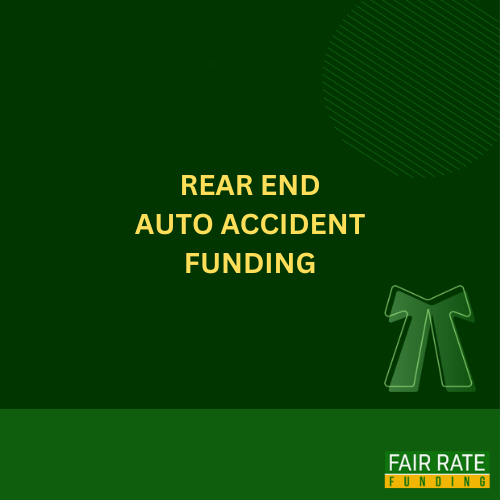Rear-End Auto Collisions: Fault and Legal Implications
Rear-end auto accidents are among the most common types of car accidents, accounting for a significant portion of collisions. Determining liability in rear-end auto collisions is crucial for the involved parties seeking compensation and justice. In this post, we delve into the dynamics of rear-end collisions, explore the factors influencing liability, discuss the legal implications for both drivers and analyze lawsuit loans for rear end auto accidents.
Understanding Rear-End Collisions
A rear-end auto accident occurs when one vehicle crashes into the back of another. While many of these accidents happen at lower speeds, such as in stop-and-go traffic, parking lots, or intersections, many involve serious and permanent injuries. Despite the seemingly straightforward nature of these incidents, determining liability can sometimes be a tricky proposition. Generally, liability with rear end auto accidents depends on:

- Presumption of Fault: In many jurisdictions, there is a legal presumption that the driver of the rear vehicle is at fault. This presumption is based on the idea that the rear driver has a duty to maintain a safe following distance and exercise caution to avoid colliding with the vehicle in front.
- Contributory and Comparative Negligence: However, it’s essential to recognize that liability may not be absolute. The front driver may also contribute to the collision through actions such as sudden stops, erratic lane changes, or faulty brake lights. The concepts known as contributory and comparative negligence can affect a plaintiff’s ultimate recovery where both parties share a degree of fault.
Factors Influencing Rear End Auto Accident Liability
Below is a list of common liability factors with regard to rear end automobile accident lawsuits.
- Following Distance: One of the critical factors in determining liability is the following distance between vehicles. Drivers are expected to maintain a safe distance to allow for a prompt reaction if the vehicle in front slows down or stops suddenly.
- Distracted Driving: Distracted driving is a prevalent cause of rear-end collisions. Activities such as texting, talking on the phone, or adjusting the radio divert a driver’s attention from the road, increasing the risk of a collision.
- Traffic Conditions: The conditions of the road, such as heavy traffic, poor weather, or construction zones, can impact liability. Drivers are expected to adjust their speed and behavior accordingly in these situations.
If You Have Any Questions, Call 888-964-2224
WE ARE HERE TO HELP YOU!
Rear End Auto Accident Legal Implications
Determining liability with rear end auto accident lawsuits can lead to the following legal outcomes:
- Insurance Claims: The at-fault driver’s insurance is typically responsible for covering the damages in a rear-end collision. The injured party can file a claim to seek compensation for medical expenses, property damage, and other losses.
- Personal Injury Lawsuits: In cases of severe injuries, the injured party may pursue a personal injury lawsuit against the at-fault driver. This legal action allows them to seek additional compensation for pain and suffering, lost wages, and other non-economic damages.
- Traffic Violations and Criminal Charges: In cases of extreme negligence, such as driving under the influence or reckless driving, the at-fault driver may face traffic violations or criminal charges, leading to additional legal consequences.
Liability and Lawsuit Loans

Rear-end auto collisions may appear straightforward, but the determination of liability involves careful consideration of various factors. Drivers should prioritize safe driving practices, and in the event of a collision, understanding the legal implications can help navigate the legal process of seeking compensation and justice.
The legal process can take time however, and many injured plaintiffs find it hard to stay financially afloat while they wait for their cases to resolve. For this reason, lawsuit loans were created.
What are Lawsuit Loans?
Lawsuit loans are specialty transactions where a lawsuit lender will advance money to a plaintiff prior to settlement. The deal involves a transfer of property rights in the future proceeds of the case. In other words, plaintiffs sell a part of their settlement ahead of time. In return, they pledge a portion of the settlement when it is received. The repayment amount depends on how long it takes for the case to finish.
Getting Started with Lawsuit Loans
If you need cash now while waiting for your case to finish, we can provide lawsuit settlement funding to help you while you wait.
For more information regarding lawsuit loans for car accidents and other lawsuits, simply complete our submission form or click the APPLY NOW button at the top or bottom of this page. The best way to get started is to call us now at 888-964-2224 and speak to one of our representatives directly. Our agents are always available and at your service.
We will contact you immediately and begin the process. You can then relax and allow Fair Rate Funding to work for you. We routinely provide lawsuit settlement funding for rear end auto accident cases within 24 hours of receiving the paperwork from your attorney.
Thank you for your interest in lawsuit loans from Fair Rate Funding.

